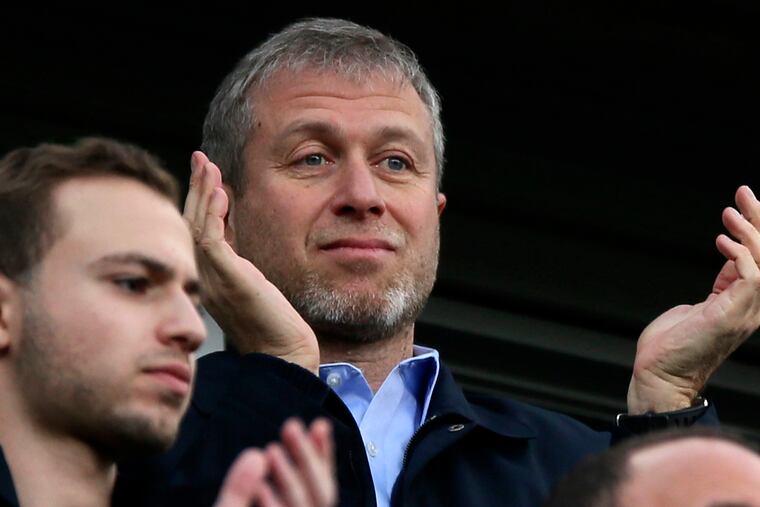Soccer power Chelsea feels effects of sanctions imposed on Russian owneer Roman Abramovich
Abramovich was sanctioned for his close relationship with Russian President Vladimir Putin.

LONDON — Chelsea fans received an unwelcome present on the Premier English League team’s 117th birthday Thursday: British government sanctions against Russian owner Roman Abramovich that only served to intensify the team’s growing pariah status in the soccer world.
The aluminum magnate is among seven wealthy Russians who had their assets frozen under British sanctions on Thursday in response to Russia’s invasion of Ukraine.
Under the unprecedented government action, Chelsea will operate through the end of the season May 31 with a special “Russia Regulations” license that among other restrictions prohibits the team from selling new tickets or merchandise, or signing new players.
The club’s future was already in doubt: Abramovich, whose $2 billion investment in Chelsea over 19 years transformed the team into a force in European football, had put the squad up for sale last week amid growing calls that sanctions be imposed on a man the government has labeled a “pro-Kremlin oligarch” linked to “destabilizing ... undermining and threatening” Ukraine.
The British government also has alleged that Abramovich has obtained financial benefits from Putin’s administration, including contracts in the buildup to Russia hosting the 2018 World Cup.
“We are now turning the screw on influential oligarchs enabling his regime,” Culture Secretary Nadine Dorries said of Putin. “The important measures announced today will clearly have a direct impact on Chelsea FC and its fans but we are working hard to make sure the club and the national game are not unnecessarily harmed.”
Club sponsors are responding in their own way: The telecommunications firm Three announced Thursday that it would suspend its sponsorship of the team and remove its logo from Chelsea’s jerseys.
“We recognize that this decision will impact the many Chelsea fans who follow their team passionately,” Three said. “However, we feel that given the circumstances, and the government sanction that is in place, it is the right thing to do.”
But the logos still appeared when, in the only uplifting moments of the day for Chelsea, the men’s team won 3-1 at Norwich in the Premier League and there was a 4-1 Women’s Super League success at West Ham.
Soccer fans immediately felt the effects of the British government’s sanctions: Anyone with tickets until the end of the season will be able to attend matches, but those without will stay without while away fans will be unable to purchase tickets for upcoming games held at Stamford Bridge stadium.
The new rules also limit the club to spending a maximum of 500,000 pounds ($657,000) on each match at Stamford Bridge, including on security and catering. A maximum of 20,000 pounds can be spent on travel to matches. Chelsea plays in France at Lille in the Champions League next week.
Staff, including players, will continue to be paid. The club’s wage bill was almost 28 million pounds ($37 million) a month in the most recent accounts. The club also has been effectively placed under a transfer ban since it cannot spend money to register new players.
“We are very disappointed right now because of this,” said Tanjim Islam, a frustrated Chelsea fan from Vancouver, Canada, who stood outside the team’s hastily closed merchandise shop at the stadium on Thursday. “We traveled from the west coast (of Canada) to be here.”
Even worse for fans, though, is uncertainty about the club’s fate.
“We had a great legacy over the past 20 years,” Islam said. “We are doing great and (now) we don’t know where our club will be in the future.”
Lifelong Chelsea fan Freddie Frampton called the sanctions “hypocrisy at its highest level,” citing the European Union, of which Britain is no longer a part.
“The EU is paying Putin 1 billion (euros) a day for Russian energy. On the other side, they’re funding Ukraine with weapons. The madness has to end. Sanctioning Abramovich changes nothing. It’s not Abramovich who is funding this war, it’s Europe. Why take away our fun?”
Chelsea completed the set of major trophies under Abramovich by winning the Club World Cup last month, joining two Champions League titles and five Premier Leagues under his ownership.
The invasion of Ukraine is not the first event to affect Abramovich’s relationship with Britain. He had already been banned from the country since 2018, when he withdrew an application to renew his visa amid a clampdown on rich Russians after a former Russian spy and his daughter were poisoned in the English city of Salisbury. Britain blamed Russia for the pair’s exposure to a nerve agent, an allegation Moscow denied.
Abramovich made his fortune in oil and aluminum during the chaotic years that followed the collapse of the Soviet Union in 1991. British government officials estimate his worth at more than 9 billion pounds ($12 billion).
The oligarch has said proceeds of the club’s sale, which is subject to government approval, will go to a foundation he started for victims of the war in Ukraine. In two statements he has issued since the war began, however, Abramovich has refrained from condemning Russia’s invasion of Ukraine. The sale is on hold under the sanctions.